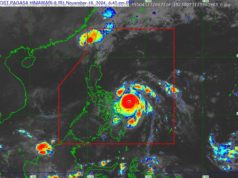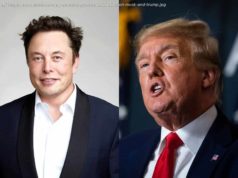World markets roiled as Beijing threatens new duties in response to Trump tariff hikes.
Fears of a trade war roiled financial markets and sent the dollar wobbling Friday after Beijing retaliated against the Trump administration’s tariff hikes by threatening import duties on U. S. goods.
Stocks plunged on Wall Street after U. S. President Donald Trump imposed sanctions Thursday on goods and investment from China. The Dow Jones industrial average dropped more than 700 points as investors feared trade tensions between the world’s largest economies would escalate.
That fear rippled into Europe. In early trading, Germany’s DAX slid 1.3 percent to 11,941.68, France’s CAC 40 lost 1.3 percent to 5,101.63 and Britain’s FTSE 100 shed 0.8 percent to 6,899.14.
In Asia, markets ended sharply lower after a stomach-churning ride. Japan’s benchmark Nikkei 225 index plunged 4.5 percent to 20,617.86, its second-biggest daily decline in a year, and South Korea’s Kospi tumbled 3.2 percent to 2,416.76. Hong Kong’s Hang Seng lost 2.5 percent to 30,309.29 and the Shanghai Composite in mainland China sank 3.4 percent to 3,152.76. Australia’s S&P/ASX 200 skidded 2 percent to 5,820.70. Benchmarks in Taiwan, Southeast Asia and India also posted sizeable losses.
Wall Street was poised to open lower. Dow futures fell 0.4 percent to 23,859.00 and broader S&P/500 futures were down 0.3 percent to 2,636.70.
« If the tariffs go ahead as planned, then we believe China will retaliate. It is impossible to imagine that they cannot. And then we expect the U. S. to retaliate further, » said Rob Carnell, ING’s chief Asia economist. « This can turn ugly on a global scale very quickly.
The planned U. S. sanctions include tariffs on $48 billion worth of Chinese imports as well as restrictions on Chinese investments. Trump said he was acting in response to theft of American technology.
The U. S. Trade Representative identified 1,300 product lines as potential targets, including aerospace, information and communication technology, and machinery. A more complete list is due soon, to be followed by a 30-day comment period.
Concern that trade conflicts could wreak havoc on the world economy deepened as China responded to Trump’s recent tariff hikes on steel and aluminum by warning it could order higher import duties on U. S. goods including pork, apples and steel pipe.
China’s Commerce Ministry urged Washington to negotiate a settlement, saying tariffs undermine the global trading system.
« Everbody’s pushing each other around to do some negotiating, » said David Collins, chief operations officer at CMC China Manufacturing Consultants, which advises companies on setting up factories in China. « Trump is negotiating. He’s pushing back on the Chinese, and the Chinese will push back. »
On Thursday, investors fled stocks and bought bonds, which sent bond prices higher and yields lower. With interest rates falling, banks took some of the worst losses. Technology and industrial companies, basic materials makers and health care companies also fell sharply.
Peter Donisanu, an investment strategy analyst for the Wells Fargo Investment Institute, said the risk of a damaging trade war is still low because the Trump administration is targeting specific goods that aren’t central to China’s economy. That could change if it puts tariffs on products like electronics or appliances imported from China.
« If the Trump administration really wanted to hurt China and start a trade war, then they would go after those larger sectors, » he said.
The risk of a U. S-China trade war is a regional concern, given the myriad supply chains and other ties across Asia. For example, South Korea’s largest trading partner is China. The U. S. is its second biggest.
« I’m worried that it would affect the national economy, » said S. E. Kim, an employee at a construction company in Seoul. « If the U. S. imposes tariffs on China like that, I think there would be some damage on us in the long term as well. »
Concern over higher U. S. tariffs on steel and aluminum eased somewhat when the Trump administration said some countries will be exempt. U. S. Trade Representative Robert Lighthizer said Thursday that the tariffs won’t apply to the European Union, Canada, Mexico, Argentina, Brazil and Australia.
Japan’s trade minister described the U. S. decision not to exclude Japanese exports as « extremely regrettable. »
« We will continue our effort patiently to persuade the U. S. to remove Japan from the list, » Japanese Minister of Economy, Trade and Industry Hiroshige Seko told reporters.
A traditional « safe haven » from risk, the Japanese yen touched a 17-month high against the U. S. dollar in response to the jitters over trade.
The dollar fell to 104.87 yen from 105.28 yen in late trading Thursday. The euro rose to $1.2337 from $1.2302.
Oil futures rallied. Benchmark U. S. crude rose 48 cents to $64.77 a barrel in electronic trading on the New York Mercantile Exchange. The contract shed 87 cents, or 1.3 percent, to close at $64.30 a barrel in New York. Brent crude, used to price international oils, rose 33 cents to $68.71 a barrel in London.






